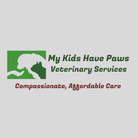Parvo Information for Owner
What is parvovirus?
Parvovirus is a highly contagious virus that can affect all cats and dogs, but unvaccinated pets younger than 4 months of age are at the most risk. It attacks the white blood cells and gastrointestinal tract.
How is parvovirus spread?
Parvovirus is spread by direct pet-to-pet contact with contaminated feces (stool), environments, or people. The virus can survive for up to a month indoors, and outdoors it can survive for up to a year!
Puppies are exposed to parvo in two ways:
What are the signs of parvovirus?
How is parvovirus diagnosed?
Diagnosis is often suspected based on the pet’s history, physical examination, fecal exams, and laboratory testing. At our clinic, we use a specific Parvo SNAP test to confirm diagnosis of parvo.
Parvovirus treatment options:
We highly recommend taking your pet to an emergency clinic for around the clock care when a pet is diagnosed with parvovirus. An estimate for parvovirus treatment at an emergency clinic can range between $1,000 to $4,000.
At My Kids Have Paws, we offer outpatient services. Depending on the weight and severity of symptoms, it can range between $100 to $300 per pet. Sometimes if the pet is above the 20 pound weight, it can be a bit higher in price.
How is parvovirus treated?
There is no specific drug available that will kill the virus. Treatment aims to support the pet’s body system until the pet’s immune system can fight off the virus. Treatment should be started immediately after a positive diagnosis. Aggressive treatment and early recognition are essential to successful outcomes.
Outpatient treatment consists of subcutaneous fluids, deworming, a series of injections, and monitoring the patient. In some cases, an IV catheter may be required to give the pet a better chance of survival. If diagnosed with parvovirus, it is recommended to drop off your pet in the morning so we can monitor your pet and push food/treatment throughout the day.
How is parvovirus prevented?
Having your pet vaccinated and keeping good hygiene is critical in preventing parvovirus. Young pets are very susceptible to infection, particularly because the natural immunity provided in their mothers’ milk may wear off way before the pets’ own immune systems are mature enough to fight the infection. Keep young dogs isolated until they finish their puppy vaccinations and make sure their environment is clean.
Puppies and kittens should receive a series of boosters, especially during the first few months of life. Regardless of how many doses of the vaccine given prior, pets should receive another dose of the vaccine between 14 to 16 weeks of age. To protect adult pets, owners should make sure that their pet is up to date on their vaccinations. Contact your veterinarian for confirmation or to schedule an appointment for their vaccinations.
Until your pet has received their complete series of vaccinations, pet owners should be cautious of bringing their pets to areas where young pets congregate (boarding facilities, dog parks, grooming, obedience classes, etc.). If your pet is experiencing any parvo related symptoms, do not take them to any places where they might come in contact with another pet. Contact your local veterinarian for treatment options and parvo testing.
In spite of proper vaccination, a small percentage of pets do not develop protective immunity and remain susceptible to infection.
Parvovirus is a highly contagious virus that can affect all cats and dogs, but unvaccinated pets younger than 4 months of age are at the most risk. It attacks the white blood cells and gastrointestinal tract.
How is parvovirus spread?
Parvovirus is spread by direct pet-to-pet contact with contaminated feces (stool), environments, or people. The virus can survive for up to a month indoors, and outdoors it can survive for up to a year!
Puppies are exposed to parvo in two ways:
- Direct exposure - sniffing, licking or eating poop or vomit that contains the virus
- Indirect exposure - coming into contact with virus particles that are on things like food or water bowls, collars and leashes, and the hands and clothing of people who handle infected pets.
What are the signs of parvovirus?
- Lethargy
- Loss of appetite
- Abdominal pain and bloating
- Fever or low body temperature
- Vomiting
- Severe, often bloody, diarrhea
How is parvovirus diagnosed?
Diagnosis is often suspected based on the pet’s history, physical examination, fecal exams, and laboratory testing. At our clinic, we use a specific Parvo SNAP test to confirm diagnosis of parvo.
Parvovirus treatment options:
We highly recommend taking your pet to an emergency clinic for around the clock care when a pet is diagnosed with parvovirus. An estimate for parvovirus treatment at an emergency clinic can range between $1,000 to $4,000.
At My Kids Have Paws, we offer outpatient services. Depending on the weight and severity of symptoms, it can range between $100 to $300 per pet. Sometimes if the pet is above the 20 pound weight, it can be a bit higher in price.
How is parvovirus treated?
There is no specific drug available that will kill the virus. Treatment aims to support the pet’s body system until the pet’s immune system can fight off the virus. Treatment should be started immediately after a positive diagnosis. Aggressive treatment and early recognition are essential to successful outcomes.
Outpatient treatment consists of subcutaneous fluids, deworming, a series of injections, and monitoring the patient. In some cases, an IV catheter may be required to give the pet a better chance of survival. If diagnosed with parvovirus, it is recommended to drop off your pet in the morning so we can monitor your pet and push food/treatment throughout the day.
How is parvovirus prevented?
Having your pet vaccinated and keeping good hygiene is critical in preventing parvovirus. Young pets are very susceptible to infection, particularly because the natural immunity provided in their mothers’ milk may wear off way before the pets’ own immune systems are mature enough to fight the infection. Keep young dogs isolated until they finish their puppy vaccinations and make sure their environment is clean.
Puppies and kittens should receive a series of boosters, especially during the first few months of life. Regardless of how many doses of the vaccine given prior, pets should receive another dose of the vaccine between 14 to 16 weeks of age. To protect adult pets, owners should make sure that their pet is up to date on their vaccinations. Contact your veterinarian for confirmation or to schedule an appointment for their vaccinations.
Until your pet has received their complete series of vaccinations, pet owners should be cautious of bringing their pets to areas where young pets congregate (boarding facilities, dog parks, grooming, obedience classes, etc.). If your pet is experiencing any parvo related symptoms, do not take them to any places where they might come in contact with another pet. Contact your local veterinarian for treatment options and parvo testing.
In spite of proper vaccination, a small percentage of pets do not develop protective immunity and remain susceptible to infection.


